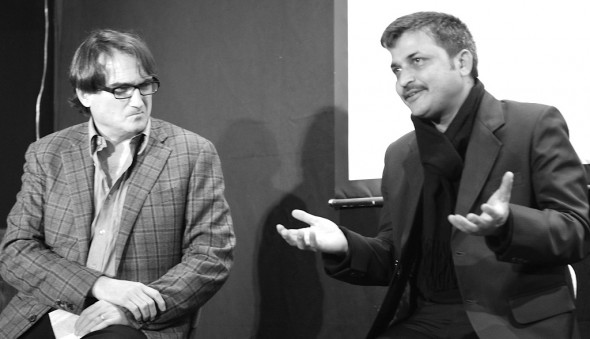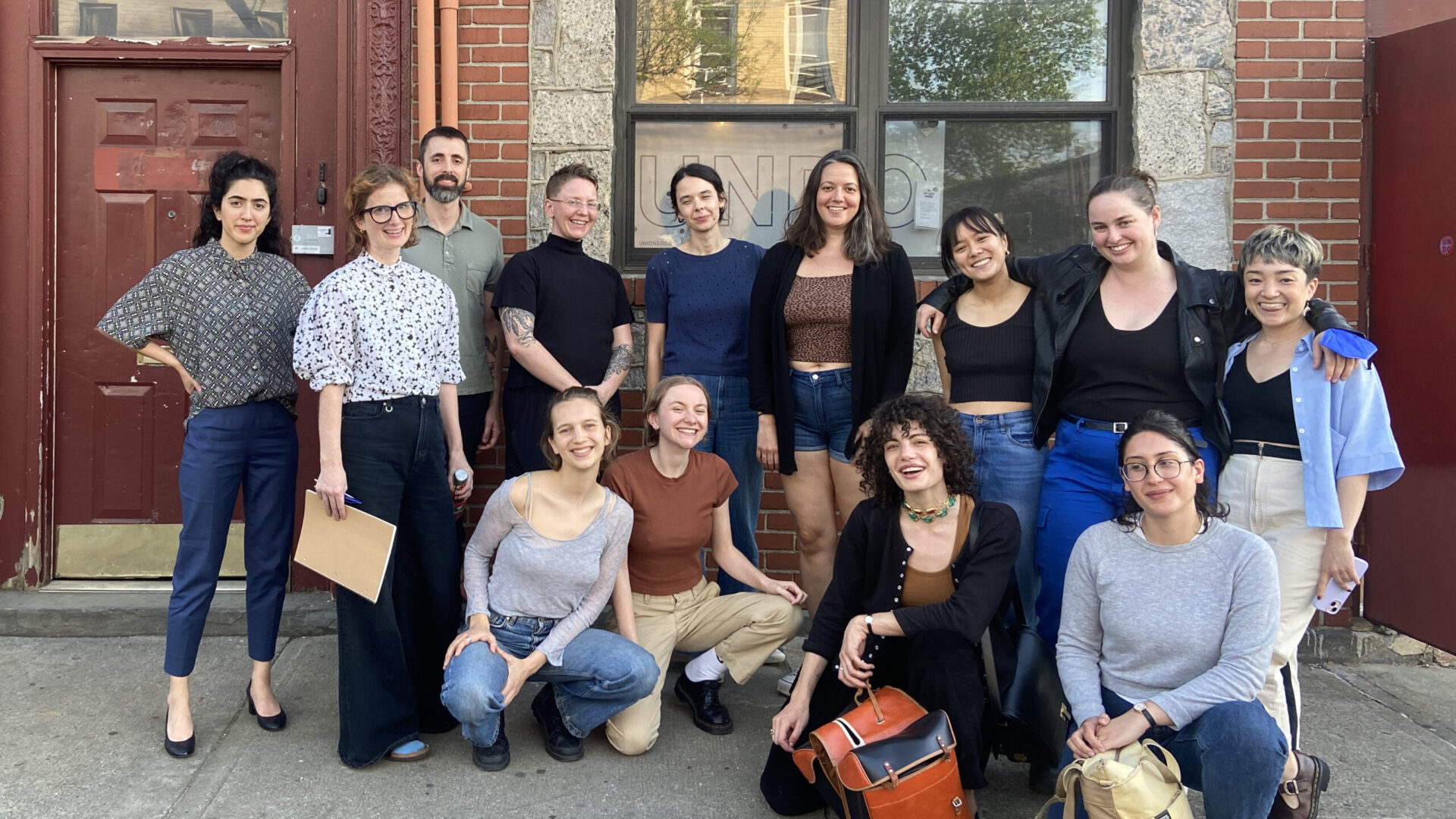
Kathryn Myers: Order Buy I was sort of wondering, did he intend for it to be a silent film, or did he realize that in the end words or an overvoice would have destroyed this film because it wasn’t that kind of film. Other people can make that kind of film. He didn’t make that kind of film.
Audience Member #1: I am not a big Robert Gardner apologist. I think some of his work is far more exoticizing than this. If he had removed “Benares” from the title, well… You could argue that he intentionally calls it ‘Benares’ to frame that it’s an outsider’s perspective—not calling it ‘Varanasi’—and in not translating the people’s voices, it could be making it exotic and mystifying, but it could also be giving them the authenticity of their own private language and not naming it and letting all the words be the most important thing. I know you are all fans of art, so you wouldn’t necessarily believe there is one right way or wrong way to do a painting. I’m not saying this is the best film ever made about Varanasi, but I think it’s his movie. It’s subjective. It’s objective in that it’s trying to observe, but subjective as every film is in all the choices of editing and cutting and framing the camera. Even using sound. Using a microphone or not using a microphone. Or mixing. It happens in every film.
Richard Allen: And this was overt really. It was obvious that there was a lot of manipulation of sound and it was obviously self-consciously done. So it wasn’t disguising it in any way–the manipulation. It was using it poetically or expressively.
Annette Danto: What I wanted to say is, as filmmakers, the question I have is, “Do we have any sort of responsibility to the people we point our cameras at or is anything free game, basically?” Now, everybody in this room can pick up a camera and decide they are going to make a documentary about anything and everything.
Richard Allen: And they do.
Annette Danto: And they do. But should we think a little bit about what we are pointing the camera at and why and the implications of it? Not just for ourselves and our own portfolio, but also for the people we are putting on film forever and the images that we’re sending around the world on YouTube. Of course, it’s a very general statement, but something to think about when you’re trying to make documentaries about people from different cultures from your own and any other sensitive subjects.
Richard Allen: I think you’re raising a very important issue, but it’s an issue that is, in fact, raised not just by this filming of another culture. It’s raised if you just go out on the street and point a camera in New York.
Annette Danto: That’s right.
Richard Allen: Any activity of documentary filmmaking raises an ethical question. In fact, any photograph of someone is raising an ethical question.
Audience Member #1: I think we assume a lot. We assume that people care. That film is so fantastically important, that it matters so much to their lives. Some people I think it does, but…
Richard Allen: My question is, what constitutes consent?
Audience Member #2: online The viewer and the subjects don’t seem to be given much benefit of the doubt in this conversation. I appreciate the idea that you don’t want someone to get a bad impression on their first viewing. But, if we’re thinking about this as art, if art’s concern is the first impression of the masses and how they might misinterpret it, we’re screwed.
Richard Allen: We’d have no art.
Audience Member #2: So, I feel like, in this kind of space, I would hope that it would be assumed, when I see someone, I’m actually asking myself, “What am I thinking about this person?” “How much am I trying to prevent being manipulated?” Coming from an art perspective, a lot of these questions end up reinforcing a lot of the problems as opposed to opening up those ideas. This film, for me, wasn’t even about universal connections. For me, I was just thinking this was an hour and a half of something very powerful that made me think about all other kinds of questions. Not just about religious rituals or death rituals, but behaviors. It’s more like music or poetry. The idea that I know anything almost doesn’t matter to me. I think of it as completely appropriate, taken with or without consent. And I think there is probably a lot more consent than we’re assuming there was.
Annette Danto: Well, we don’t really know that.
Audience Member #2: Well, I’m kind of interested in the idea that it’s irrelevant. That’s its own set of questions and that’s a copyright, legal question, all those things. But I’m really interested in what the film did that has nothing to do with legal rights.
Richard Allen: As a work of art, as a visual poem.
Annette Danto: Order It’s a certain amount of power that you have. And to create art, it gives you a certain amount of power. And I think, it’s not equal in this world. Not everyone shares that power and access. These people that were being filmed probably didn’t have cameras and would not be able to come to this country and make a movie about all of us sitting here in this underground space…
Audience Member #2: But I get that from this film. I get the messiness of the world in globalization. And if there was somehow more context given and they showed you, you know, this many people this many miles away that didn’t have cameras, I don’t know what purpose that would serve. Other than trying to give you information to let you think that you know something. And this just felt so much more powerful, that it’s beyond the idea of knowing something. It’s saying you can’t know things.
Pradosh Mishra: What is your name?
Audience Member #2: Ted.
Pradosh Mishra: Ted, I wish everyone had your eyes. I have no objection. It’s all my personal view. You would never want New York to be portrayed in a way that you would not like. I was just scared that if this film goes of the first signal of the city… But that was entirely my issue. But, I wish everybody had your eyes. I have no complaint. If you’re looking at it as a creative object, it’s a very powerful image. No doubt about that. It’s a wonderful documentation. I have no question about it. It had enormous layers. Layers of life, layers of belief, layers of ritual, and layers of city. The only thing I would say is that I wish everyone would have your eyes.
Audience Member #3: I just wanted to suggest that the camera of the documentary filmmaker is something of a Rorschach test in that you get to see the preoccupations. And given our discussion of the hegemonic gaze, I would like to link that to the dwelling on odor and filth and scatological things. And that says a lot about those that were pointing the camera. The selectivity there says more about what we might style as a neo-orientalist gaze. I think that that has to be registered. Because there were so many choices. You could’ve seen the dingy walls, which come about from mildew and the climate, not because they are dirty in the sense that they would be here. One scene of whitewashing the walls, which goes on all the time too, would have helped. And then, of course, to apply the same possible choice to not just dwelling on carcasses of animals, but to the flowers, the incense. There were nice smells too that could have been accessed and suggested. There were choices made that were quite offensive, I believe.
Audience Member #2: Didn’t they show incense and flowers?
Audience Member #3: Not proportionately, no.
Richard Allen: But why do we have to be balanced? Why this idea of the perfect balance? The yin and the yang? That every artist has to somehow achieve this balance. Isn’t that an impossible ideal for art?
Audience Member #3: It’s about the obsession with odor, which is seen here.
Richard Allen: Pills I would defend the obsession with that as being because the film is fundamentally about death. And death is about putrefaction. It’s about decay. It’s about all those things that are presented in the film.
Annette Danto: But death is not just about putrefaction. It is a positive step. It’s a release from suffering.
Richard Allen: But that side seems to be represented as well. In the birds, in the sun, in the kites, in the actual ritual of the man who was washing himself in the water. The film is a very beautiful film, I don’t see it as a film just about putrefaction at all. I think that’s the central element. It wants to register the fact of death, the reality of death. The fact that death is, “dust to dust.” But at the same time, it does so in a celebratory, beautiful way. I think this is a marvelously beautiful film. And an affirmation of the culture that it represents. Not in any way a diminution or an undermining of it. I don’t see that at all.
Audience Member #3: But to the extent that this participates in a much larger discourse, I just think that this reminds us of that moment when the representation of poverty becomes the poverty of representation, to paraphrase John Hutnyk, who wrote The Rumour of Calcutta. These kinds of moves are made all the time and I teach courses on Orientalism and so forth and spend a lot of time trying to disabuse students of a lot of these assumptions that would be fomented by this film.
[Pause.]
Richard Allen: Ok, I think that’s a wrap.
[Laughter.]
– Thanks to Jim Supanik for editorial help on this article.





